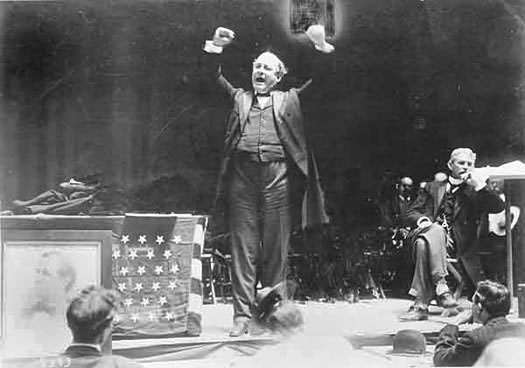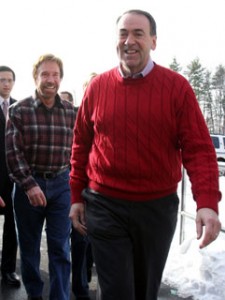What Evangelical Populism Lost
The established forces in his conservative party fear and denounce him. They cringe whenever he attacks Wall Street, vows to use government to help the poor
Jul 31, 20201.2K Shares630.9K Views
Photo Credit: Nebraskastudies.org
The established forces in his conservative party fear and denounce him. They cringe whenever he attacks Wall Street, vows to use government to help the poor or castigates the failed policies of the incumbent president of his own party. A devout Christian, he mixes Scripture into nearly every speech he gives. But the insurgent candidate’s homespun wit and eloquence disarms his critics and have gained him many admirers.
This describes the presidential campaign Mike Huckabee has run in 2008 – and the one William Jennings Bryan ran in 1896. That was the year “The Great Commoner” delivered his famous “Cross of Gold Speech” — a stirring attack on plutocrats and corporations — and was the Democratic nominee for president, only to lose to William McKinley. who outspent him by a margin of 10-to-1. Indeed, Bryan was an evangelical populist who emerged from near-obscurity as a former congressman from Nebraska to become a serious contender for the White House. So it’s not surprising that some journalists have taken to calling the erstwhile governor of Arkansas, “William Jennings Huckabee.”
However, the differences between the two men are significant — and reveal how radically the fault-lines of religion and politics changed over the last century. In Bryan’s heyday, most Americans were evangelical Protestants, and split their votes about evenly between the two major parties. But now they are about a quarter of the population, and have been the GOP’s most reliable constituency since Ronald Reagan’s election in 1980. Huckabee, whatever his rhetoric of the moment, is a loyal member of that right-wing flock.
The former Baptist preacher, like Reagan, does have a knack for coining one-liners that Bryan, the most popular orator of his time, would have admired. “In many ways,” Huckabee mused recently, “I’m like a lot of people in the United States: I’m a guy over 50 looking for a job.” But the policies he advocates have almost nothing in common with those of the Great Commoner.
Bryan helped initiate the progressive income tax; Huckabee wants to abolish it in favor of a national sales tax that would fall most heavily on the working and middle class. Bryan tried to expand federal power to aid working people; Huckabee opposes universal health care “mandated by federal edict.” Bryan was the first major-party nominee to receive the official backing of organized labor; most unions shun Huckabee, who governed a right-to-work state where Wal-Mart has its headquarters. Bryan hated war and resigned as secretary of state in 1915, when he thought President Woodrow Wilson was leading the U.S. into the hell of World War I; Huckabee strenuously supports the war in Iraq.
How to apply one’s faith to public life has always been a controversial matter. In 1896, Bryan’s Republican opponents lambasted him for using the Crucifixion as a metaphor for his monetary policy. But neither in that campaign, nor during his two other races for president (1900 and 1908), did he ever, like Huckabee, advertise himself as “a Christian leader,” give sermons in churches or call for amending the Constitution to fit “God’s standards.”
For Bryan, who idolized Thomas Jefferson, the separation between church and state was absolute. As an exponent of the Social Gospel, he used the Bible to justify aid to the poor and scorn for the rich – not to install his faith into law. What’s more, he needed the votes of Catholics and Jews, and so avoided taking positions that would alienate them.
Only during the 1925 Scopes Trial – his last public act, long after he’d run for office – did Bryan make a religious question a political priority. He helped prosecute a high-school instructor in Tennessee who had broken a state law that forbid teaching the theory of evolution. Scopes was found guilty and paid a small fine. But Bryan’s image as a dogmatic foe of science damaged his reputation among non-fundamentalists from then until now.
Still, Bryan’s political legacy dwarfs whatever significance Huckabee is likely to achieve.
The Democrats nominated Bryan for president three times because they endorsed his progressive populist stands on the issues. His religion was not a factor. Though he never won the presidency, he transformed his party. Before the 1896 campaign, the Democrats were a bastion of merchants and bankers who cringed at corporate regulation and viewed labor unions as a threat to their profits. Bryan paved the way for Wilson’s New Freedom and Franklin D. Roosevelt’s’s New Deal. He may have been the most successful loser in American political history.
But Huckabee, as the results of the first contests in the 2008 race demonstrated, is popular mainly among his fellow conservative evangelicals – and has struggled even to win a majority of their votes. His affable style and sympathy for those bruised by the economy can’t conceal the fact that he represents just one slice of a GOP coalition that is in danger of breaking into its various parts – economic libertarians, security hawks and conservative Christians. These days, most evangelicals care more about a moral politics of the body than the Social Gospel — perhaps one reason why Huckabee favors amendments to ban gay marriage and outlaw abortion. But such opinions make millions of Americans uneasy, and could actually help prevent him from being the GOP’s standard-bearer this fall.
So, sorry, Mike Huckabee, you’re no William Jennings Bryan.
Michael Kazin, a history professor at Georgetown University, is the author of “A Godly Hero: the Life of William Jennings Bryan.” His other books include “The Populist Persuasion: An American History.”

Hajra Shannon
Reviewer
Latest Articles
Popular Articles

